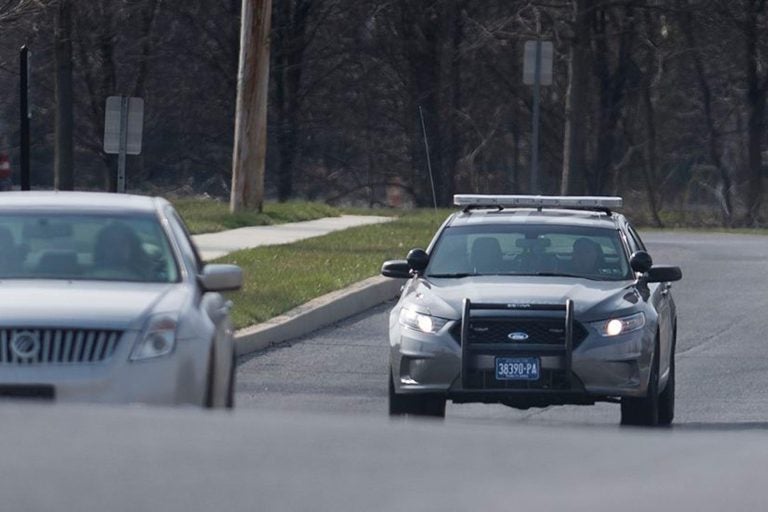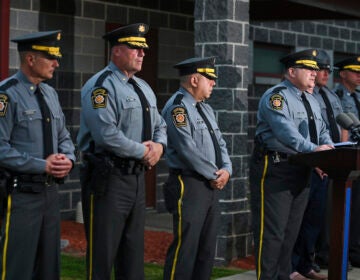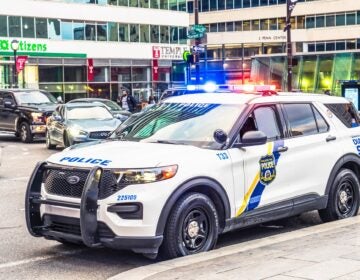How Pa. troopers use sweating, stuttering during traffic stops to launch vehicle searches
Law enforcement across the country pulls drivers over for alleged, minor traffic infractions with the intent to look for possible criminal activity. Pa. is no exception.

Law enforcement across the country pulls drivers over for alleged, minor traffic infractions with the intent to look for possible criminal activity. Pennsylvania is no exception. (Jose F. Moreno/Philadelphia Inquirer)
This story originally appeared on Spotlight PA.
___
Spotlight PA is an independent, non-partisan newsroom powered by The Philadelphia Inquirer in partnership with PennLive/The Patriot-News, TribLIVE/Pittsburgh Tribune-Review, and WITF Public Media. Sign up for our free newsletters.
When Brandon Neely was pulled over in August 2020 for crossing into the area between a highway lane and exit ramp after leaving a casino in Dauphin County, a Pennsylvania State Police trooper asked if he could search Neely’s vehicle.
Neely, knowing his rights, said no. But the trooper searched anyway, as Neely streamed video to Facebook Live.
“If an individual who said they had nothing illegal in the vehicle says, ‘No, I don’t want you to search my car,’ it could be an additional indicator [of illegal activity],” the officer, who was not identified, said in the video.
After 30 minutes, the trooper found nothing and let Neely go.
Law enforcement officers across the country have long used administrative or other traffic violations considered to be a low public safety threat as a gateway for searching vehicles and compiling incriminating evidence. Conversations about this tactic were reignited by the killing of 20-year-old Daunte Wright earlier this month.
A Brooklyn Center, Minnesota police officer stopped 20-year-old Wright for expired tags, and for possibly hanging an air freshener on his rearview mirror. The officer who pulled Wright over, Kim Potter, later killed him.
Since then, Potter has resigned from the police force and is being charged with manslaughter, and the city’s police chief left his post.
“Are the roads safer because you stopped someone because of an expired tag or an air freshener?” asked David Harris, a law professor at University of Pittsburgh who specializes in police training. “Traffic stops are the most common interaction police have with Americans and also they can be dangerous.”
In reviewing dozens of affidavits of searches that were deemed illegal by judges, collected during a five-year period, Spotlight PA last year found Pennsylvania State Police often used a wide range of what is known as pretextual stops — pulling people over for driving in the center or right lanes for too long, or having an unlit license plate — to stop drivers and then question them.
From there, officers scan for anything they might perceive as evidence the person is committing or has committed a crime.
Troopers have also been trained in recent years to look for more than 50 “criminal indicators,” including high car mileage, if the car is a rental, any amounts of money in the car, audible sighs, or if the driver is being overtly cooperative, according to an unofficial form obtained by Spotlight PA.
While the state maintains troopers no longer use it, its messaging still lingers. By sweating, stuttering, or simply misstating something and then backtracking — officers can use these traits they perceive as incriminating evidence.
This is a decision that has been upheld by the U.S. Supreme Court.
“Once police pull people over, it’s often a fishing expedition,” said Jonathan M. Smith, executive director of the Washington Lawyers’ Committee in Washington, D.C. who last year represented a Maryland family in a case where police pulled them over for a windshield obstruction and later conducted an illegal search of their vehicle.
A State Police official previously said troopers are enforcing traffic laws, and that escalation through these tactics can yield large-scale drug busts or weapons collections.
“At the end of the day, there’s sort of this philosophical argument and then there is the legal sufficiency argument,” Lt. Col. Scott Price, deputy commissioner of operations for Pennsylvania State Police, said in an interview last year. “We’re looking at totality. Nervousness alone is not a probable cause, but nervousness in concert with inconsistent statements, or a strong smell of marijuana [is]. I think that’s the key point.”
But a Spotlight PA investigation with The Appeal last year found that judges don’t always agree. Many have thrown out searches initiated by pretextual traffic stops, because there was no actual probable cause.
In response to the reporting, the state Office of the Inspector General opened an investigation into some traffic stops and searches by State Police, and that review is ongoing.
An added worry is how police use pretextual stops disparately against people of color, said Siyu Liu, a criminal justice professor at Penn State, who co-authored a research article this year on how police use traffic stops to conduct searches.
“With minorities being more likely to be pulled over for traffic violations, their exposure to criminal investigation and police scrutiny increases,” she told Spotlight PA.
Neely, who is Black, was not required to tell the trooper anything beyond what he needed to issue a ticket or warning. But even in cooperating, Neely was incriminated.
In response to Neely’s case, State Police spokesperson Ryan Tarkowski declined to comment, but he asserted that troopers should not conduct searches based on drivers denying entry into their vehicle.
“It was a complete violation of my rights,” Neely told Spotlight PA. “I knew my rights, and even when I exercised them, I still was pulled out and searched.”
Additional reporting by Joshua Vaughn of The Appeal.
 WHILE YOU’RE HERE… If you learned something from this story, pay it forward and become a member of Spotlight PA so someone else can in the future at spotlightpa.org/donate. Spotlight PA is funded by foundations and readers like you who are committed to accountability journalism that gets results.
WHILE YOU’RE HERE… If you learned something from this story, pay it forward and become a member of Spotlight PA so someone else can in the future at spotlightpa.org/donate. Spotlight PA is funded by foundations and readers like you who are committed to accountability journalism that gets results.
WHYY is your source for fact-based, in-depth journalism and information. As a nonprofit organization, we rely on financial support from readers like you. Please give today.






